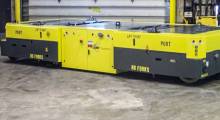Not only do automation adopters need to overcome supply chain challenges; so too do robot providers. Resgreen Group International Inc. announced this week the arrival of various long-lead materials allowing it to start large-scale production of its PullBuddy fleet of automated guided vehicles, or AGVs.
“Our manufacturing area has experienced a large influx of material this week that is necessary to begin production of our signature AGV, PullBuddy,” said Parsh Patel, CEO of Resgreen Group International (RGGI). “We are excited to be able to offer the opportunity to fill orders of a time-sensitive nature.”
“Supply chain issues continue to affect everyone within the industry,” he noted. “The RGGI team has been working diligently to mitigate these issues. Our efforts are showing with the arrival of materials necessary for us to begin production.”
PullBuddy AGV joins RGGI’s lineup
Shelby Township, Mich.-based Resgreen Group makes a range of robots including the PullBuddy and the LilBuddy autonomous mobile robots (AMRs), which recently went into floor testing for pre-production.
The company also has a suite of safety products, including wireless stack lights, wireless push buttons, and smart load-handling frames.
The PullBuddy AGV is less than 11 in. in height and can move loads up to 2,000 lb., according to RGGI. To navigate, the robot uses magnetic tape and open-source software. The robot uses the Robot Operating System (ROS) and can use lidar for long-distance travel and magnetic tape for precise locations, said RGGI.
In addition to mobile robots, RGGI provides consulting services including back-end operational oversight, material handling assessment, workflow analysis, and steady-state yield management. It uses artificial intelligence and offers management systems. The company said its engineers have years of experience in the materials handling and robotics industries.
As global supply challenges persist, RGGI said it will continue to develop and implement innovative and cost-effective systems.
The global market for AGVs could expand from 138,740 units in 2019 to more than 272,700 units by 2025 at a compound annual growth rate (CAGR) of 13.32%, according to Statista.com.
Article topics
Email Sign Up
















